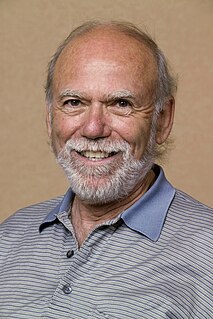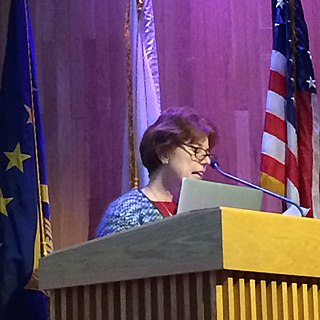Related Research Articles

The European Organization for Nuclear Research, known as CERN, is a European research organization that operates the largest particle physics laboratory in the world. Established in 1954, the organization is based in a northwest suburb of Geneva on the Franco–Swiss border and has 23 member states. Israel is the only non-European country granted full membership. CERN is an official United Nations Observer.

The European Science Foundation (ESF) is an association of 11 member organizations devoted to scientific research in 8 European countries. ESF is an independent, non-governmental, non-profit organisation that promotes the highest quality science in Europe. It was established in 1974 and its offices are located in Strasbourg, France (headquarters).

The Joint Institute for Nuclear Research, in Dubna, Moscow Oblast, Russia, is an international research center for nuclear sciences, with 5500 staff members, 1200 researchers including 1000 Ph.Ds from eighteen countries, like Armenia, Azerbaijan, Belarus, Kazakhstan and Ukraine, members of the institution. Most scientists, however, are eminent Russian scientists.

Ashton Baldwin Carter is an American public policy professor who served as the 25th Secretary of Defense from February 2015 to January 2017. He is currently Director of the Belfer Center for Science & International Affairs at Harvard Kennedy School.
Reimar Lüst was a German astrophysicist. He worked in European space science from its beginning, as the scientific director of the European Space Research Organisation (ESRO) from 1962 and as Director General of the European Space Agency (ESA) from 1984 until 1990.
The Science and Technology Facilities Council (STFC) is a United Kingdom government agency that carries out research in science and engineering, and funds UK research in areas including particle physics, nuclear physics, space science and astronomy.
The LIGO Scientific Collaboration (LSC) is a scientific collaboration of international physics institutes and research groups dedicated to the search for gravitational waves.

William James Stirling was a physicist who served as the first Provost of Imperial College London. He was appointed to this role in August 2013 and retired in August 2018.

Charles Pence Slichter was an American physicist, best known for his work on nuclear magnetic resonance and superconductivity.

Fabiola Gianotti is an Italian experimental particle physicist, and the first woman to be Director-General at CERN in Switzerland. Her mandate began on 1 January 2016 and runs for a period of five years. At its 195th Session in 2019, the CERN Council selected Gianotti for an unprecedented second term as Director-General. Her second five-year term began on 1 January 2021 and go on until 2025. This is the first time in CERN's history that a Director-General has been appointed for a full second term.

Ali Akbar Salehi is an Iranian academic, diplomat and the head of the Atomic Energy Organization of Iran. He served as head of the AEOI from 2009 to 2010 and was appointed to the post for a second time on 16 August 2013. Before the appointment of his current position, he was foreign affairs minister from 2010 to 2013. He was also the Iranian representative in the International Atomic Energy Agency from 1998 to 2003.

John William Harris is an American experimental high energy nuclear physicist and D. Allan Bromley Professor of Physics at Yale University. His research interests are focused on understanding high energy density QCD and the Quark-gluon plasma created in relativistic collisions of heavy ions. Dr. Harris collaborated on the original proposal to initiate a high energy heavy ion program at Cern in Geneva, Switzerland, has been actively involved in the CERN heavy ion program and was the founding spokesperson for the STAR collaboration at RHIC at Brookhaven National Laboratory in the U.S.

Barry Clark Barish is an American experimental physicist and Nobel Laureate. He is a Linde Professor of Physics, emeritus at California Institute of Technology and a leading expert on gravitational waves.

Barbara Jacak is a nuclear physicist who uses heavy ion collisions for fundamental studies of hot, dense nuclear matter. She is Director of the Nuclear Science Division, Lawrence Berkeley National Laboratory, and a professor of Physics at UC Berkeley. Before going to Berkeley, she was a member of the Department of Physics and Astronomy at Stony Brook University, where she held the rank of Distinguished Professor. She is a leading member of the collaboration that built and operates the PHENIX detector, one of the large detectors that operated at the Relativistic Heavy Ion Collider at Brookhaven National Laboratory, and was involved in the discovery of the quark gluon plasma and its strongly coupled, liquid-like behavior. Throughout her career she has served on many advisory committees and boards including the National Research Council Committee on Nuclear Physics, and the Physical Review C Editorial Board.

Peter Jenni, is an experimental particle physicist working at CERN. He is best known as one of the "founding fathers" of the ATLAS experiment at the CERN Large Hadron Collider together with a few other colleagues. He acted as spokesperson of the ATLAS Collaboration until 2009. ATLAS is a world-wide collaboration which started in 1992 involving roughly 3,000 physicists at 183 institutions in 38 countries. Jenni was directly involved in the experimental work leading to the discoveries of the W and Z bosons in the 1980s and the Higgs boson in 2012. He is (co-)author of about 1000 publications in scientific journals.

John M. "Jack" Carpenter was an American nuclear engineer known as the originator of the technique for utilizing accelerator-induced intense pulses of neutrons for research and developing the first spallation slow neutron source based on a proton synchrotron, the Intense Pulsed Neutron Source (IPNS). He died on 10 March 2020.

Paolo Giubellino is an experimental particle physicist working on High-Energy Nuclear Collisions. Currently he is the joint Scientific Managing Director of the Facility for Antiproton and Ion Research (FAIR) and the GSI Helmholtz Centre for Heavy Ion Research (GSI) and Professor at the Institute of Nuclear Physics of the Technische Universität Darmstadt.
Dilip Devidas Bhawalkar is an Indian optical physicist and the founder director of the Raja Ramanna Centre for Advanced Technology (CAT), an institute under the Department of Atomic Energy, serving as a centre for higher studies in the fields of lasers and particle accelerators. He is credited with pioneering research in optics and lasers in India and is reported to have contributed in making CAT a partner in the International Linear Collider and Large Hadron Collider experiments of the European Organization for Nuclear Research (CERN). He is a recipient of the Shanti Swarup Bhatnagar Prize, the highest Indian award in science and technology. The Government of India awarded him the fourth highest civilian award of the Padma Shri in 2000.
Shyam Sunder Kapoor is an Indian nuclear physicist and a former director of Bhabha Atomic Research Centre. Known for his research on fission and heavy-ion physics, Kapoor is an elected fellow of all the three major Indian science academies – Indian Academy of Sciences, Indian National Science Academy and National Academy of Sciences, India – as well as the Institute of Physics. The Council of Scientific and Industrial Research, the apex agency of the Government of India for scientific research, awarded him the Shanti Swarup Bhatnagar Prize for Science and Technology, one of the highest Indian science awards, for his contributions to Physical Sciences in 1983.
The European Federation of Organisations for Medical Physics (EFOMP) was founded in May 1980 in London to serve as an umbrella organisation representing the national Medical Physics societies in Europe. It took just twenty-seven months from the first initiative, by the Council of the Hospital Physicists' Association in February 1978, to reach agreement on the formation of the EFOMP. The inaugural meeting took place in London, UK on the 9th of May 1979 and the first President of EFOMP was John Clifton.
References
- 1 2 "Sample Issue" (PDF). Nuclear Physics News. Retrieved 1 May 2016.